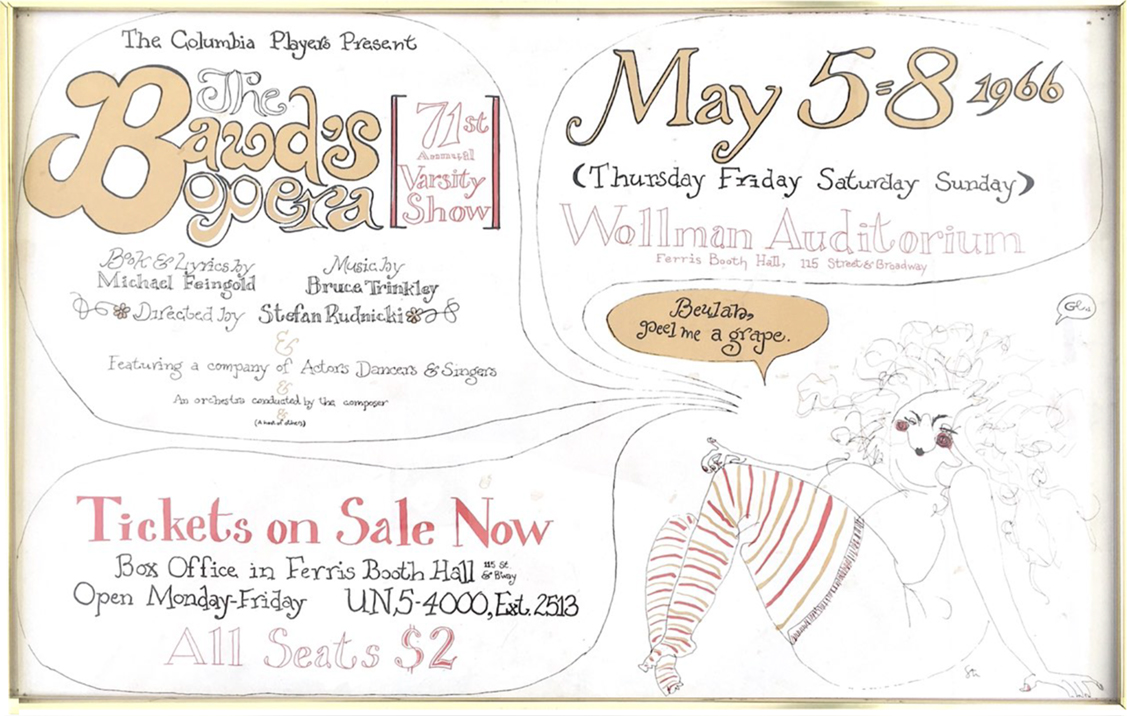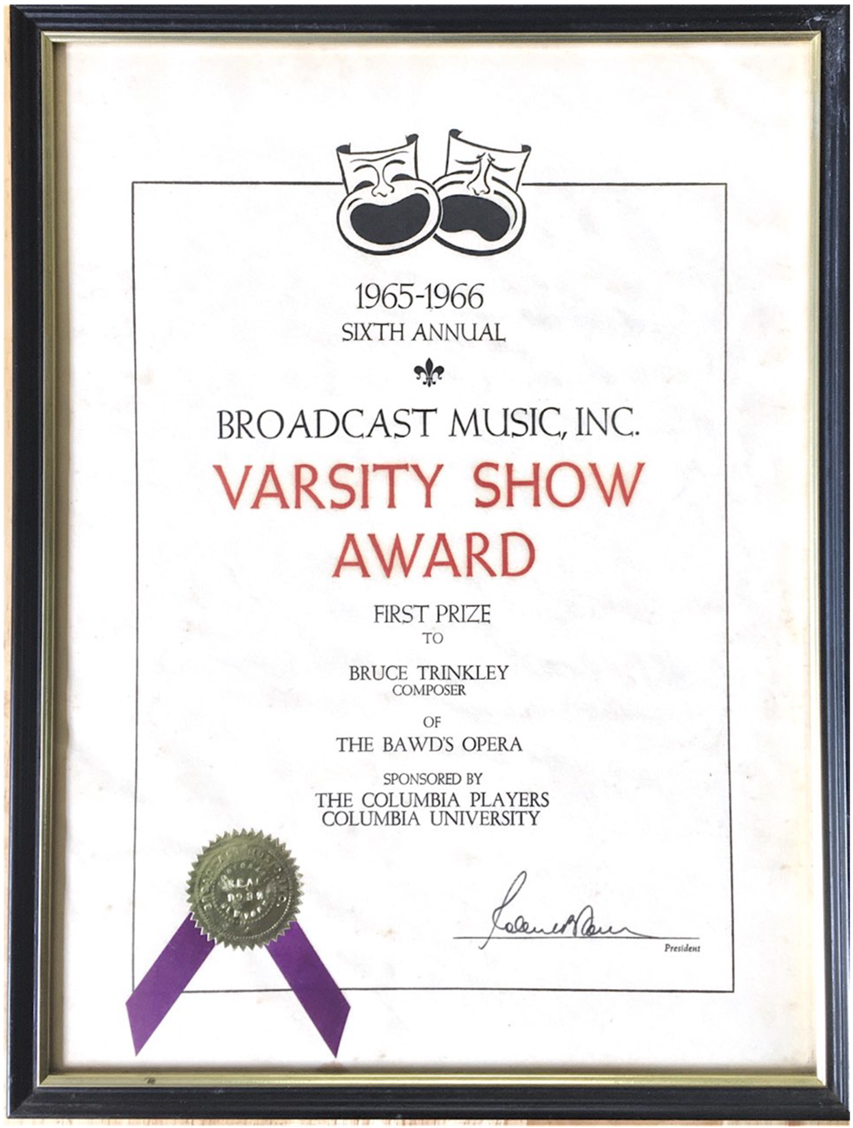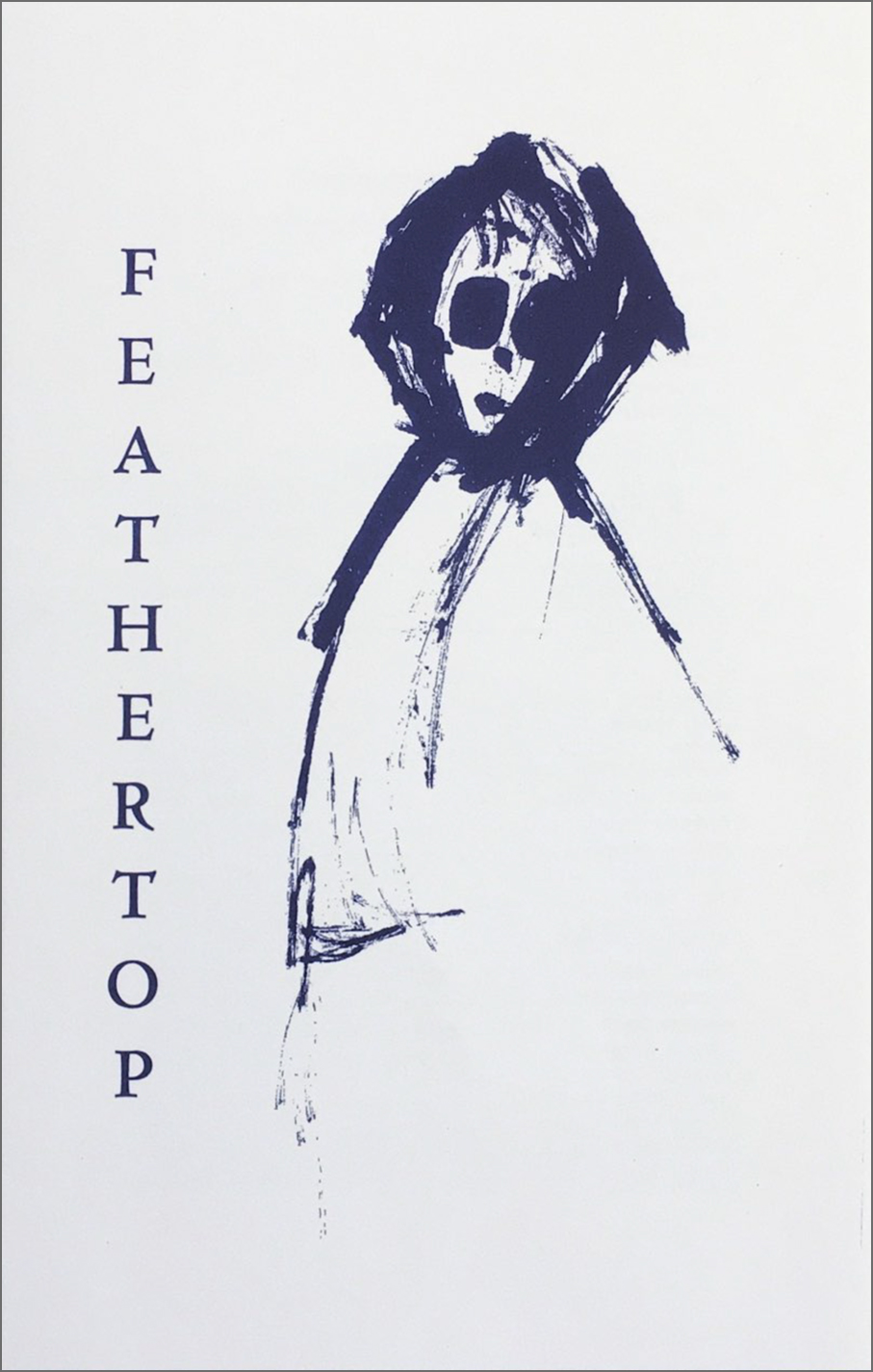OVERTURE
I always wanted to be a high school music teacher.
I ended up at Columbia because I had a piano teacher and a high school choral director who had both gotten degrees from Columbia Teachers College. I figured this was the best way to achieve my dream.
But at Columbia College, the undergraduate school at Columbia, to which I had applied and won a scholarship, there was no music education curriculum. If you wanted to major in music you had to choose among theory, history or composition. I chose composition - but still wanting to be a high school teacher.
Then, in my junior year, Columbia Players held a competition to select the composer of the Varsity Show - a long running Columbia tradition - with shows that had been written by Richard Rodgers and Lorenz Hart in the 1920s. The competition required setting several song lyrics from the script that fellow student Michael Feingold had written. I won the competition - and when The Bawd’s Opera won the BMI Prize as the Best College Musical of the Year (1966) I was off and running. More musicals followed, The Pill, again with Feingold - the very first rock musical - 6 months before Hair; and then Feathertop, a 2nd Varsity Show, with book and lyrics by John Litvack (who went on to become a major force in television, eventually producing Hill Street Blues). I was now well on my way to being a composer.
(The rest of my journey is included in my memoir My Life in Music/Music in my Life on the About page of this website.)
Two Columbia Varsity Shows and Other Musical Works


The Bawd's Opera, or The Third House of Parliament
71st Annual Columbia Varsity Show. 1966.
Ballad opera for soloists, chorus and orchestra. Book and lyrics by Michael Feingold.
Winner of the 1965-1966 Broadcast Music, Inc. Varsity Show Award.
Premiere:
Columbia Players, May 5-8, 1966. Wollman Auditorium, Ferris Booth Hall, Columbia University.
Directed by Stefan Rudnicki.
And as the poster says: “featuring a company of Actors Dancers & Singers/An orchestra conducted by the composer & a host of others.” The Bawd’s Opera was written as a modern recreation of the 18th century ballad opera, the most famous of which was John Gay’s The Beggar’s Opera (1728). Like that seminal work, our version deals with contemporary politics with characters drawn from both high society and politics and the lowlifes of the brothel and street vendors. As in The Beggar’s Opera there are a great many but mostly rather short songs; our songs are all original compositions, but highly influenced by the models presented by ballad operas - folksongs, arias, choruses. For a synopsis, we supply the narrative from the 2016 revival of the work for the 50th Anniversary of the Columbia and Barnard classes of 1966, as so wonderfully delivered by Valerie Shepherd (the original Mother Rigby in Feathertop).
View Piano Vocal Score. View cast list from premiere. View list of songs.
Read narrative from 2016 revival (plot synopsis) written by Jason Charnesky.
Listen to Original Cast Recording from 1966 (from LP with attendant surface noise, alas . . .)
Read Mark Minton’s review in The Columbia Spectator, May 6, 1966.

Feathertop 72nd Annual Varsity Show. 1967.
Musical for soloists, chorus and orchestra.
Book and lyrics by John Litvack (1945-2015) based on the short story by Nathaniel Hawthorne (1804-1864).
Premiere:
Columbia Players, May 4-7, 1967. Wollman Auditorium, Ferris Booth Hall, Columbia University.
Directed by Anthony Abeson.
Mother Rigby, contralto Margaret Fowler
Judge Goodkin, baritone J. Harris Spero
Dickon, high baritone Richard Kandrac
Feathertop, tenor Tom Neugebauer
Faith, soprano Mary Cross
Katherine Osgood, mezzo-soprano Ellen Rapaport
William Osgood, baritone Gerrit Graham
Estelle Osgood, mezzo-soprano Annette Oliver
Peter Palfrey, bass-baritone Jon Bauman
Elizabeth Goodkin, soprano Julienne Marshall
Chorus of Townspeople, SATB voices
Read narrative from 2016 revival (plot synopsis). View cast list from premiere.
Download Piano Vocal Score. View production photo of Margaret Fowler (Mother Rigby), J. Harris Spero (Judge Goodkin) and Jon Bauman (Peter Palfrey)
Read Peter Ruffett’s very tepid review in The Columbia Spectator, May 5, 1967.
The listen links are all from the original cast recording (with piano) from 1967.
2. Witch’s Chant Mother Rigby View score. Sound track not available.
3. Feathertop’s Birth Mother Rigby, Dickon, Feathertop View score. Listen.
4. Nothing Ever Happens Here Osgood, Solo voices, Chorus View score. Listen.
5. Katherine’s Song Katherine View score. Listen.
6. The Witch Hunt Palfrey, Judge, Elizabeth View score. Listen.
7. The Ballad of Sir Hugh Elizabeth View score. Listen.
8. Arioso Feathertop View score. Listen.
9. Have You Ever Looked for a Witch Palfrey, Dickon View score. Listen.
10. Everybody Loves a Holiday Judge, Dickon, Feathertop View score. Listen.
11. Maypole Dream Chorus, Osgood, Judge, Mother Rigby View score. Listen.
12. The Witch Hunt (Reprise) Palfrey View score.
13. Puppet, Puppet Feathertop, Mother Rigby, Dickon View score. Listen.
14. Predestination Chorus View score. Listen.
15. The Transformation Mother Rigby, Palfrey, Judge View score. Listen.
16. Sonnet for Elizabeth Elizabeth View score. Listen.
17. Far from the Crowd Feathertop, Elizabeth View score. Listen.
The Pill Rock cantata for soprano, alto, tenor, bass; two electric guitars, bass guitar, piano, drums. 25 minutes.
Lyrics by Michael Feingold.
Produced by Columbia Players 1968. With Toni Hess, soprano (The Daughter); Julienne Marshall, soprano (The Mother); Charles Pitchford, tenor (The Son); Jon “Bowser” Bauman, bass-baritone (The Father).
Green Mansions Theatre 1968. Penn State 1971.
For score and recording see listing on Cantatas page.
Little Do We Care for Riches 1890's musical for soloists, chorus and chamber orchestra.
Book and Lyrics by Michael Feingold.
Commission and Premiere: Columbia-Barnard Summer Theatre, Kenneth Janes, producer and director,
Minor Latham Playhouse. Summer 1968.
The Red Shoes Children's musical with dance. 45 minutes.
Book and lyrics by Michael Feingold.
Commission and Premiere: Yale Repertory Company. 1969.
Directed and choreographed by Carmen de Lavallade.

Darling Musical (1970) based on the 1965 film Darling directed by John Schlesinger with screenplay by Frederic Raphael. Lyrics by Muriel Robinson.
My winning the BMI National Varsity Show Award as composer of The Bawd’s Opera gave me a cash prize, but more importantly for my career, membership in the BMI Musical Comedy Workshop run by Lehman Engel (1910-1982), the legendary Broadway music director and conductor. My one extensive project was making a musical adaptation of the Julie Christie film. The major thing I learned was that a character as vacuous as that of Diana Scott, played by Christie, was really not capable of singing with integrity - or sincerity. However I did write several songs for the male characters in the film. They were sung by John Cullum at the end of the term BMI Showcase in 1970. Several of the themes from the songs provided material for another music theatre piece, Cleo, based on the Elizabeth Taylor film, Cleopatra.
The Country Doctor Chamber opera in two scenes after the short story by Franz Kafka.
Libretto by Michael Feingold. 1970. Unproduced.
Later Works
Unruly Children Vaudeville for adults. Singers and instrumental combo.
Book and Lyrics by Roger Cornish (1934-2000).
Directed by Douglas Cook (1929-2014) and Roger Cornish.
Written to celebrate and satirize the founding fathers during the country’s Bicentennial.
Produced by Penn State University Theatre. 1979.
Read: The Fourth Annual Roger L. Stevens Address delivered by Douglas Cook at the John F. Kennedy Center for the Performing Arts, Washington, D.C., on April 20, 2003.

The Wilderness Fort Musical based on the history of Fort Roberdeau, Altoona, Pennsylvania.
Book and lyrics by Jason Charnesky.
Fort Roberdeau, known as the Lead Mine Fort, was built in 1778, during the American Revolution and was occupied until 1780. Its significance was in the production of lead for armaments during the Revolution. The musical celebrates the lives of the nearby settlers, who all had differing political allegiances, and their interaction with the soldiers garrisoned at the military post.
Commission: Fort Roberdeau Board of Directors, Charles Firmin, liaison.
Accompaniment: Piano and string bass or 18th century instrumental ensemble: Flute/Piccolo/Fife, Two Trumpets, Violin, Violoncello, Guitar, Banjo (Mandolin), Harpsichord (Electric Piano), String Bass, Percussion (timpani, snare drum, side drum, tambourine, et al.)
Preview performance by Theresa Vincent Smith, soprano; Richard Kennedy, tenor, at Fort Roberdeau.
View Fort Roberdeau’s website. View Fort Roberdeau’s history.
View Piano Vocal Score.
1. Here Is the Fort That Roberdeau Built Company View score. Listen to midi.
2. Farewell My Love Arvilla Marvell View score. Listen to midi.
3. The Two Ravens Abigail Edington View score. Listen to midi.
4. A Bit of Whiskey Private John Lane, Sergeant Giles Stephens, Corporal John Harris View score. Listen to midi.
William Tell of Warrior’s Mark (an entertainment for the garrison at the Fort)
5. Listen Well to the Story I Tell John Dee and Soldiers View score. Listen to midi.
6. I Am a Tracker Peter Reilley (William Tell) View score. Listen to midi.
7. Permit Me to Greet James Waters (Gessler) View score. Listen to midi.
8a. I Am a Free Man Peter Reilley (William Tell), Gessler, and Abigail Edington (Jimmie) View score. Listen to midi.
8b. Quaint Notion Peter Reilley (William Tell), Gessler, and Abigail Edington (Jimmie) View score. Listen to midi.
9. Since His Highness the King James Waters (Gessler) and Associates View score. Listen to midi.
10. Men of the Forest Peter Reilley (William Tell) View score. Listen to midi.
11. We Hope You Had a Pleasant Time Arvilla Marvell, John Dee and Company View score. Listen to midi.
12. Finale: God Save Great Washington Full Company View score. Listen to midi.

Rumpelstiltskin Musical for Young Audiences. Based on the story collected by the Brothers Grimm in1812
Book and lyrics by Jesse Waldinger.
A retelling of the familiar fairy tale, sympathetic to the title character. The other folks don’t fare so well.
Narrator, medium voice male or female
Juan Seponitom, tenor
Rumpelstiltskin, baritone or bass
Rupert Miller, baritone
Rapunzel, soprano or mezzo-soprano
Stage Manager, non-singing role
Accompaniment: piano with optional string bass
Premiere: Workshop Production by the State College Community Theatre, State Theatre. 2018.
Read notes. Read synopsis.
Download Piano Vocal Score.
1. Greed Juan View score. Listen to midi.
2. A Pencil for Rapunzel Rupert and Ensemble View score. Listen to midi.
3. Heir Supply Rumpelstiltskin, Juan and Rupert View score. Listen to midi.
4. Spinning Wheel Rapunzel View score. Listen to midi.
5. Spinning Wheel Reprise Rumpelstiltskin and Rapunzel View score. Listen to midi.
5a. Spinning Wheel Underscore View score. Listen to midi.
6. Fanfare: Juan’s Entrance
7. Reconciliation Rapunzel View score. Listen to midi.
7a. Reconciliation Underscore View score. Listen to midi.
8. Names Juan, Rapunzel, Narrator, Rapunzel View score. Listen to midi.
9. Finale: Once Upon a Time The Company View score. Listen to midi.
The score to Rumpelstiltskin was composed during a residency at Dorland Mountain Arts Colony in Temecula, California in February and March, 2017. The composer is deeply appreciative to Dorland for their hospitality and the wonderful Steinway grand in Horton Cottage.